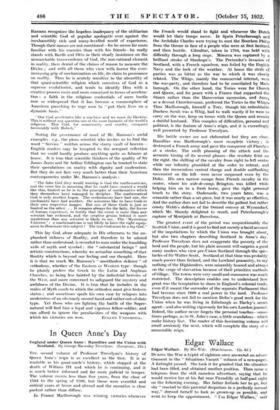In Queen Anne's Day
Tim second volume of Professor Trevelyan's history of
Queen Anne's reign is as excellent as the first. It is as readable as his great-uncle's history, which stopped at the death of William III and which he is continuing, and it is much better informed and far more judicial in temper.
The volume covers less than five years, from the close of 1704 to the spring of 1709, but those were eventful .and critical years at home and abroad and the narrative is close packed rather than diffuse.
In France Marlborough was winning victories whenever the French would stand to fight and whenever the Dutch would let their troops move. In Spain Peterborough and the Archduke Charles were trying to oust the Bourbon Philip from the throne in face of a people who were at first hesitant and then hostile. Gibraltar, taken in 1704, was held with difficulty through a long siege. Minorca was captured by a brilliant stroke of Stanhope's. The Pretender's invasion of Scotland, with a French squadron, was foiled by the English Navy and the luck of the weather. At home the strife of parties was as bitter as the war to which it was closely related. The Whigs, mainly the commercial interest, were the war-party, and therefore had to be conciliated by Marl- borough. On the other hand, the Tories were for Church and Queen, and for peace with a France that supported the Stuart rather than the Hanoverian succession, and Anne, as a devout Churchwoman, preferred the Tories to the Whigs, Thus Marlborough, himself a Tory, though his redoubtable Duchess Sarah was a Whig, had to walk warily if he were to carry on the war, keep on terms with the Queen and remain a dutiful husband. This complex of difficulties, personal and political, is the feature of Anne's reign, and it is exceedingly well presented by Professor Trevelyan.
His battle scenes are not elaborated but they are clear. Ramillies was Marlborough's most complete victory ; it destroyed a French army and gave the conqueror all Flanders at a stroke. The swift planning of the attack and the accurate timing of its several phases—the resolute feint on the right, the shifting of the cavalry from right to left centre while our infantry grumbled at the order to retreat, and then the tremendous central charge and double outflanking movement on the left—were never surpassed even by the Duke. His own narrow escape from French cavalry in the centre, where his aide-de-camp, Brington, was killed while helping him on to a fresh horse, gave the right personal touch to the story. Oudenarde, two years later, was a scramble rather than a set piece, bat it was nearly as effective. And the author does not fail to describe the gallant but rather crusty Webb's defence of the Ostend convoy at Wynendad, which Mr. Shandy delighted to recall, and Peterborough's capture of Montjuich at Barcelona.
The greatest event of the period was unquestionably the Scottish Union, and it is good to find not merely a lucid account of the negotiations by which the Union was brought about, but also two chapters describing Scotland in Anne's day. Professor Trevelyan does not exaggerate the poverty of the land and the people, but his plain account will surprise a good many readers who view pre-Union Scotland through the spec- tacles of Sir Walter Scott. Scotland at that time was probably much poorer than Ireland, and the Lowland peasantry, to say nothing of the Highlanders, were miserably housed and always on the verge of starvation because of their primitive methods of tillage. The towns were very small and commerce was much restricted. The description enables one to understand how great was the temptation to share in England's colonial trade, even if it meant the surrender of the separate Parliament that had become since 1689 a real power in the land. Professor Trevelyan does not fail to mention Defoe's good work for the Union when he was living in Edinburgh as Harley's secret agent—and also writing vigorously for his own London journal. Indeed, the author never forgets the personal touches—some- times perhaps, as in St. John's case, a little scandalous—which make history live. The reader of this fascinating volume will await anxiously the next, which will complete the story of a memorable reign.


























































 Previous page
Previous page